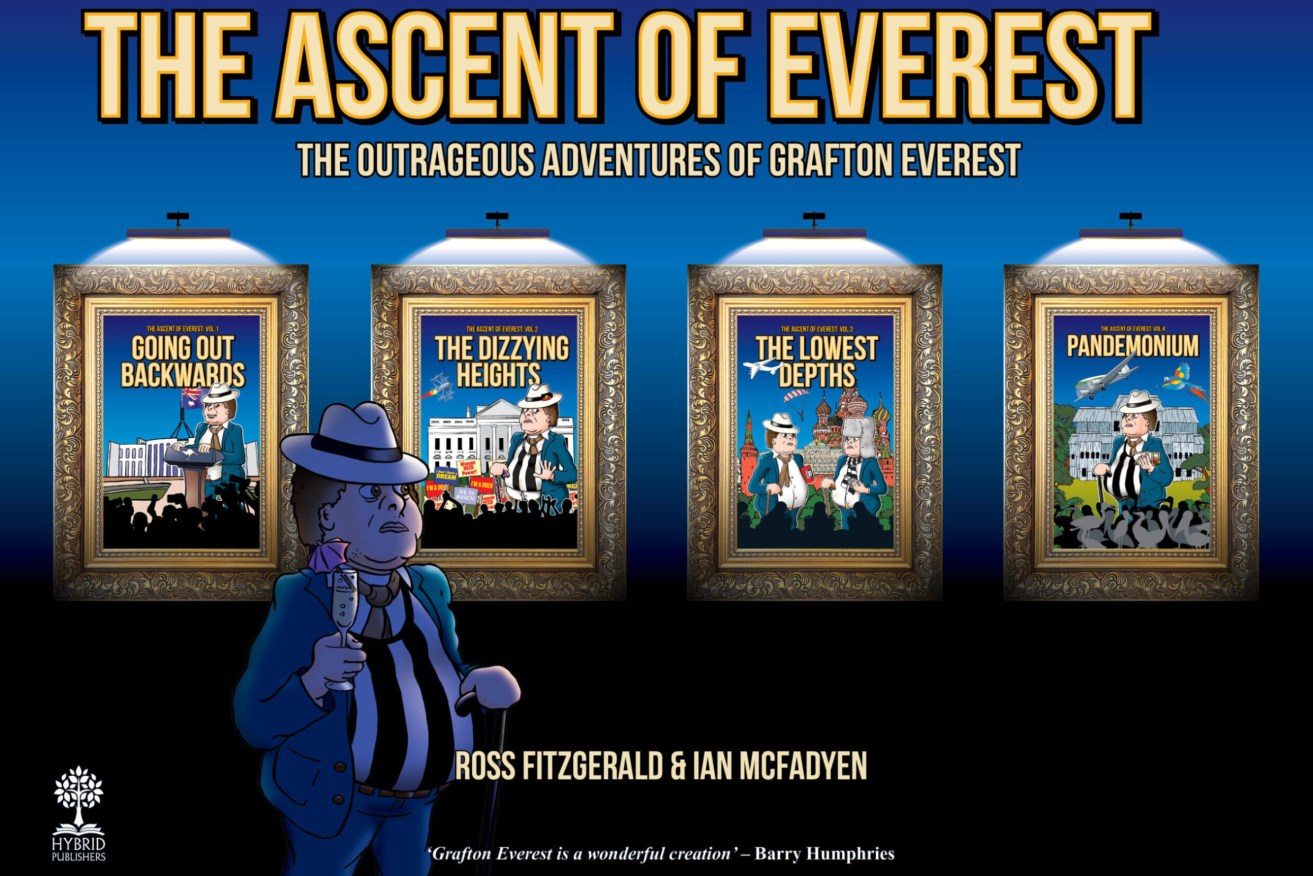The #MeToo predictor: How Grafton Everest is always one step ahead
Who knew when Professor Ross Fitzgerald created his fictional character Grafton Everest to satirise Queensland politics and academia that Grafton would go on to conquer the world in novels that predict waves of key events.

The adventures of Ross Fitzgerald's fabulous fictional character Grafton Everest is celebrated with a boxed set of four novels written with co-author, comedian Ian McFadyen.
Ross Fitzgerald and Ian McFadyen
It’s fascinating when however fanciful the satire is, this is often gazumped by political and academic reality.
The first Grafton Everest novel, Pushed From the Wings, published in 1986, predicted the rise of the #MeToo movement in academia and the growing dependency of universities on full fee-paying foreign students.
In Busy in the Fog (1990) Grafton’s long-suffering wife Janet became “a lecturer in Fibre Art”. Lo and behold, a year later a Queensland regional university appointed a woman to such a lectureship.
The climax of Busy in the Fog features the flooding of Brisbane due to a collapse of the Wivenhoe Dam, which is built on a fault. Eerily, this anticipated the 2011 floods that ravaged southeast Queensland.
In Going Out Backwards (2015) Grafton reviews the curriculum at his alma mater, the University of Mangoland. He finds that all the subjects in the traditional humanities curriculum have been relegated to a single faculty called Legacy Studies.
Since then, we have seen the role of the humanities increasingly diminished at universities, with students charged higher fees because humanities subjects are deemed “non-contributory” to the economy.
In Going Out Backwards Grafton is appointed to a committee investigating the effect of human activity on continental drift. Mining, pile driving and pogo sticks are accelerating crustal sliding, which will lead to more earthquakes volcanoes, and possible continental collisions.
The following year, people in Oklahoma claimed that fracking in oil wells was leading to an increased incidence of earthquakes in the southern states of the US.
In The Dizzying Heights (2019) Grafton visits the US where civil war has broken out between supporters of former president Ronald Thump and a left-wing coalition named the Sandersnistas. Shortly after publication, supporters of Donald Trump attacked the Capitol building in Washington in a violent attempt to shut the government down.
In The Lowest Depths (2021), which is primarily set in Russia, its dictatorial president-for-life Vladimir Putrid is assassinated.
In Pandemonium (2023), veteran Aussie diplomat Tony Murphy explains to Grafton that, while Australia does not have the money to foster alliances with small countries, it can offer something far more attractive – to move to Australia and enjoy our way of life.
Immediately after the publication of Pandemonium Anthony Albanese informed the people of Tuvalu that should their island be submerged, they were welcome to relocate to Australia.
It is unprecedented in Australia, indeed the English-speaking world, for a series of political satires to be written chronologically, following the development of the same key characters.
As Neal Price wrote in the November issue of Quadrant: “Perhaps the closest are P. G. Wodehouse’s comic novels about the bumbling Bertie Wooster and his hugely intelligent manservant, Jeeves.”
But, unlike Grafton’s adventures, Wooster and Jeeves do not develop, and Wodehouse has a stationary sense of time.
Grafton Everest moves inexorably and somewhat accidentally upwards as he goes along. In Going Out Backwards, Grafton enters, unwittingly and unprepared, into Federal politics.
In subsequent books Grafton journeys further and further into uncharted territory. He goes to London to foil a right-wing coup and becomes the first president of the new Inclusive Republic of Australia. In his capacity as president, he travels to the US where both the Democratic and Republican parties try to woo him.
In The Lowest Depths, Grafton heads a United Nations delegation sent into Russia to uncover electoral fraud. There he uncovers an ancient secret about the Romanovs. In that book, the dictatorial president for life, Vladimir Putrid, is assassinated.
As Australia’s first Australian Secretary-General of the shambolic UN, in Pandemonium Grafton is part of a plan to avert a looming global disaster. This plan involves Australian Rules football – in particular the Collingwood Magpies.
The common factor in all of his adventures is that Grafton has no idea how he got into these perilous situations, nor what he is supposed to do but, somehow, he not only survives but succeeds.
Grafton’s 10th adventure hasn’t been announced – yet. It may see the light of day.
But what heights could Grafton reach after heading the United Nations and saving the world from a cataclysm? Anything is possible in fiction. Watch this space.
Ross Fitzgerald, emeritus professor of history and politics at Griffith University is the author or co-author of nine Grafton Everest novels. He has worked with writer/actor/TV producer Ian McFadyen on four political satires – Going Out Backwards, The Dizzying Heights, The Lowest Depths and Pandemonium – now released as a boxed set: The Ascent of Everest: The Outrageous Adventures of Grafton Everest (Hybrid Publishers, $49.99)
This article is republished from InReview under a Creative Commons licence. Read the original article.
InReview is an open access, non-profit arts and culture journalism project. Readers can support our work with a donation. Subscribe to InReview’s free weekly newsletter here.












